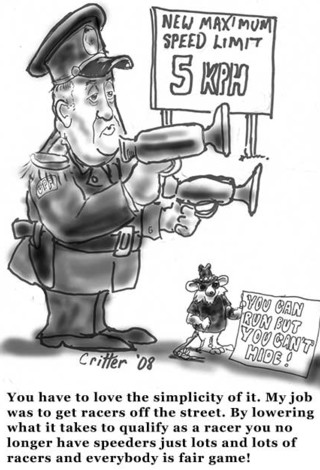Internal hearing turns ugly for Julian Fantino
OPP Commissioner Julian Fantino is known for his no-nonsense, blunt style, but a lawyer at a police disciplinary hearing is alleging his actions went beyond acceptable conduct, a charge Fantino denies.
Jan 04, 2009 04:30 AM
Robyn Doolittle
STAFF REPORTER
Julian Fantino's eyes narrow in anger. His jaw line flexes while he grinds his teeth.
Justice Leonard Montgomery has sternly cautioned the commissioner about making snarky "side comments."
Fantino, infrequently on the receiving end of orders, is struggling to contain his irritation.
"We're going to get through this day one way or the other, and I expect you as the commissioner to answer questions," Montgomery warns.
Fantino bristles.
"Yes, sir."
The seemingly routine police disciplinary hearing against Insp. Alison Jevons and Supt. Ken MacDonald began virtually unnoticed about one year ago. The pair is accused of bungling an internal investigation from their time in the professional standards bureau. The case has since evolved into an embarrassing mess for Fantino.
The colourfully spoken commissioner has been dragged into the proceedings, accused of tampering with witnesses, orchestrating a "political prosecution" against the officers, and abusing his powers as head of the Ontario Provincial Police.
Fantino flatly denies the allegations, but as lawyers for both sides spar, this increasingly bizarre case has provided a rare look inside the OPP and at the country's most famous police officer.
Throughout his four-decade career, Fantino served as chief of police in London, York and Toronto before assuming the helm of the OPP in October 2006. He owes his success – and several high-profile scandals – to his sharp tongue and blunt tactics. Love him or hate him, Fantino's old-school, tough-talking style has earned him a reputation for getting the job done.
So when trouble began to brew in the Caledon detachment, and Fantino suspected MacDonald was to blame, the commissioner acted swiftly and severely.
A rumour was circulating that MacDonald had been spreading "misinformation" to Caledon councillors about restructuring in the region. When Fantino found out, he sent an email – dated Feb. 21, 2007 – to several high-ranking officers, making a point to "cc" MacDonald, the disciplinary hearing heard.
"`UNAUTHORIZED SOURCES' be on notice," the email began, "that I consider any such activity a betrayal, that if it continues, I will stop at nothing to trace back the person(s) responsible AND deal with he/she/them personally. There is no place in the OPP for anyone to hide who is disloyal, disruptive, or dishonest, for what it's worth! J.F."
On March 1, the commissioner arranged a meeting with council to address concerns. He brought along several high-ranking officers, including MacDonald's boss, Chief Supt. Bill Grodzinski. After the meeting, Fantino gathered the officers in the parking lot.
"We were sort of, I wouldn't call it a huddle, but we were in a small semicircle," Grodzinski testified in July. "(Fantino) said to me, `Are you going to execute the disloyal one or do you want me to?'"
Grodzinski paused to collect his thoughts. He had known MacDonald personally and professionally for 20 years and believed there was no way his friend had anything to do with any "mischief-making."
He told Fantino his feelings, the commissioner listened, then closed the subject, Grodzinski testified.
"I was wrestling with '(what) do I do with this?' " Grodzinski remembered thinking. After some soul searching, he decided to phone MacDonald and warn him. Next, Grodzinski had to decide if he should document the incident.
"To make a decision about making notes on another police officer in any way, shape or form, is very significant," he testified. "For me to make notes about the commissioner of the Ontario Provincial Police, I was extremely reluctant ... I have a great deal of respect for the office."
Two weeks later, after a lengthy investigation, MacDonald and Jevons were charged with neglect of duty relating to a 2005 investigation. For nine months, Grodzinski sat on what Fantino would refer to in his testimony as "cheat notes."
Then around noon on Saturday, Jan. 5, two days before the hearing began, Fantino met at a Kelsey's restaurant with the officer assigned to investigate MacDonald and Jevons. Supt. Mark VanZant handed the commissioner a brown envelope containing, among other things, Grodzinski's notes on the "execution" comment.
Julian Falconer, lawyer for MacDonald and Jevons, would later say the ensuing events were prime examples of Fantino's alleged abuse of power.
When the hearing began on Monday, Grodzinski's notes became public. It was clear Fantino would have to testify.
At 7 a.m. the next day, Fantino called a teleconference with his senior officers, documented by Deputy Commissioner Chris Lewis.
"Grodz. – NOW to NER," Lewis wrote in his notebook. Grodzinski was to be immediately transferred to Northeast Region headquarters in North Bay.
Two days later, Grodzinski was summoned to police headquarters in Orillia about a "staffing" issue.
"Deputy Lewis indicated that a decision had been made to transfer me to North Bay ... effective the following Monday, that this was not a discussion, the decision had been made," Grodzinski testified.
Falconer has suggested Fantino's actions are tantamount to witness tampering.
When Fantino took the stand on Oct. 17, he defended the move. The commissioner testified that, for one thing, the region was in desperate need of a senior officer and for another, Grodzinski's wife was from the area.
"My understanding is that we were bringing him home," Fantino said.
Grodzinski saw it differently. "I viewed what took place that morning as an immediate, unacceptable reprisal against me for me exercising my duty. I viewed the transfer to North Bay as an immediate punishment, sanction, reprisal, use what word you wish."
He implored Lewis to reconsider. Grodzinski said his wife was sick and that they had already moved three times in as many years. Lewis said he would relay the information, but there were no guarantees.
That evening, Fantino's boss, then-deputy minister of community safety and correctional services Deborah Newman, called him with concerns about a possible "punishment transfer." At best, it was seen as poor timing.
Fantino recalled the conversation in his testimony.
"I cleared the air with her, the misinformation she was provided, that in fact, Bill Grodzinski's transfer had been discussed, that it in absolutely no way, shape or form was it a punitive thing. We were bringing him back home. The fact that we were dealing with organizational change at the very same time, balanced out with his family issues, we decided in the end not to do it because of the stated reasons earlier."
The next morning, Grodzinski got a call from a superior, inquiring whether he had contacted anyone at the ministry about the transfer. Later that day, Grodzinski was informed he could stay in his position as commander of highway safety.
"It's an extraordinary coincidence in timing," Falconer challenged Fantino at the hearing.
"Life is full of coincidences, but if you look at the issues that we discussed that day, they were all major organizational issues that needed to be addressed," Fantino rebutted.
At one point during Fantino's testimony, it appeared the commissioner was tipped during a lunch recess about an inconsistency in his evidence on another issue. When Fantino seemed to change his story after the break, Montgomery appeared livid, sending the commissioner out of the room and cautioning his lawyer, Brian Gover.
At the end of the day, a decision was made for the commissioner to return to finish his cross-examination on Nov. 5. That didn't happen. Gover launched a motion to have Montgomery removed on account of the alleged bias of the adjudicator – who was chosen by Fantino – against the commissioner.
This will be the subject of debate when the hearing resumes on Thursday.
Sunday, January 4, 2009
Subscribe to:
Post Comments (Atom)
They had No Choice!

They wore these or I took away thier toys for 7 days!
"Damn Street Racer"pays with Brusies


















No comments:
Post a Comment